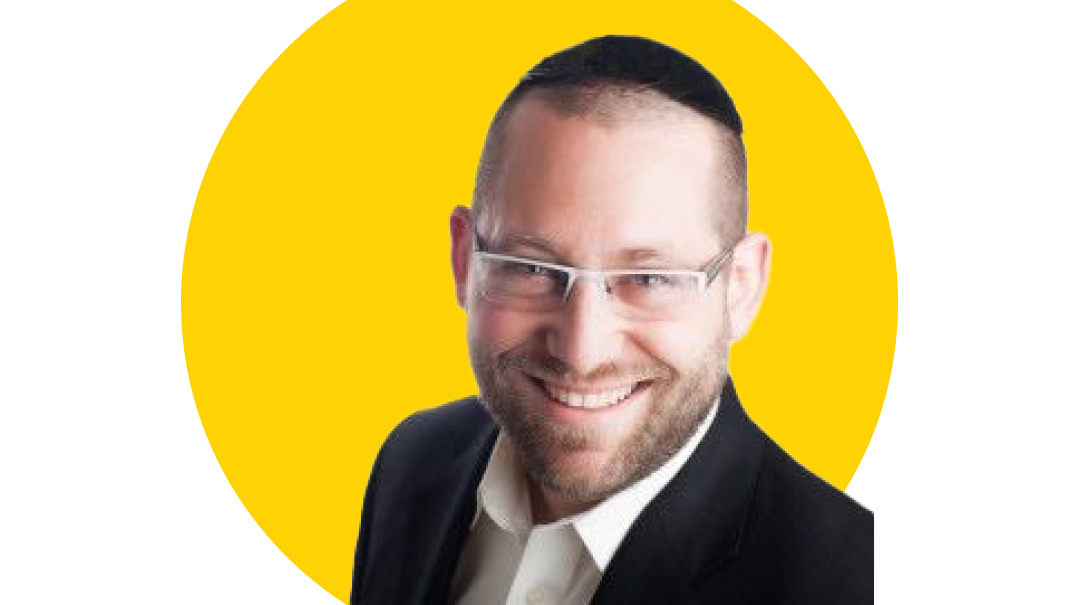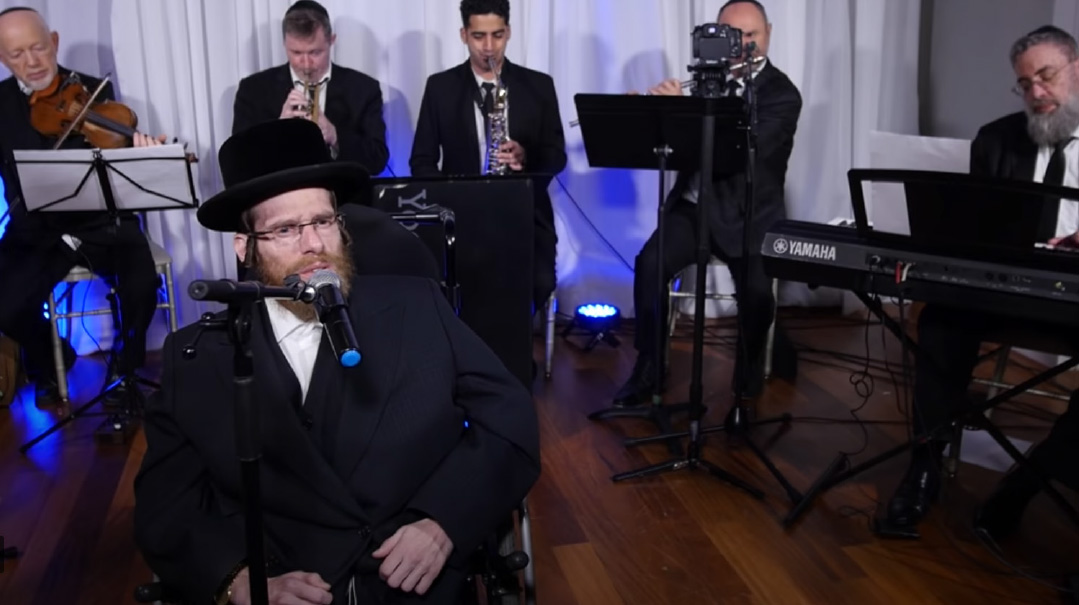MOSHE SHERIZEN
| May 14, 2024He’s a passionate advocate of the idea that everyone can cultivate a personal musical expression.

You might know the name MOSHE SHERIZEN as the author of The Easy Shmeezy Guide to Hebrew, The Easy Shmeezy Guide to Yiddish, The Easy Shmeezy Guide to Spanish, and The World’s Funniest Joke Book, but he’s also a visionary in the realm of education and enrichment. His latest collaboration is with DAASS.com, known for its professional courses, some of them music-related (featuring instructors such as Mendy Hershkowitz teaching music theory and Nachman Dreyer on playing guitar). He’s a passionate advocate of the idea that everyone can cultivate a personal musical expression.
A SONG THAT GIVES ME CHIZUK
There are some songs I can listen to over and over, and one of them is “Im Ein Ani Li,” composed by Yossi Green for Shloime Gertner’s first album, Nisim. The song is a little like life itself — a strong beat, but also an actual tune, hartzig but not gentle. And to me, the message is that I am the only person who can take care of myself and do my thing. No one is going to do it for me.
A SONG THAT BRINGS PEOPLE TOGETHER
Carlebach’s “Lemaan Achai” is very special. I moved recently, and in the shul that I joined, we sing it every Friday night after Kabbalas Shabbos. It adds something special.
A SONG THAT HAS AMAZING VOCAL ARRANGEMENTS
In the 1990s, there was an Israeli group of three brothers — Yitzchak, Yossi, and Boaz Goldshmidt — called “Kol Achai,” who were popular for a couple of years. In some songs they used a full band, and in others just guitar and the three vocalists, with the vocal harmonies taking the place of the band. I don’t really know if they were popular everywhere in the frum world — I come from Detroit where they once did a concert — but the singing and harmonies were beautiful. They had a distinct and original sound, nothing you could point to as Carlebach influence or MBD-style. I’d choose their “Anim Zemiros” from their album Hashkifah as my best example.
A PASUK AND TUNE THAT ARE A PERFECT MATCH
“Ani yeshainah velibi eir, kol dodi dofeik, pischi li…” composed by Rav Boruch Ber Leibowitz ztz”l. There is something very special about a song from an adam gadol, someone fully immersed in Torah — it’s like the equivalent of daas Torah on music. You can feel that it has come from a high place, a place of purity. The words are about “the voice of my beloved knocking.” When you knock, sometimes you get a response right away, but if you don’t, you knock louder. Reflecting that, this song starts with a gentle knock, but the high part becomes louder and more insistent. We don’t hear the voice of Hashem, but we do experience the knocks, and we can feel He’s there. Years ago, living in Yerushalayim, I would join the Shalosh Seudos of Rav Tzvi Meir Silberberg, and they’d always sing this.
WHAT MUSIC DOES FOR OTHERS
We have a gemach called Gemach Freilich, which is like a Chaverim volunteer group for the soul. We’re not coming on emergency dispatch with orange vests, but we have a group of guys who will go over to people who need uplift. We visit a lot of people who are unwell, physically or emotionally, to “mach freilich.” Often, even if they’re barely up to talking, they’ll join in song. One Erev Pesach, we had a group go to make a kumzitz for someone at three thirty in the afternoon, because that was what he needed. It’s hard to make time for bikur cholim when you have a busy schedule, but all we have to do is think that as hard as our lives are, the patient has it much, much, harder.
THE MUSIC I MISS DURING SEFIRAS HA’OMER
When I’m driving. I used to do a lot of driving, and I’d use my time by listening to podcasts. But now that most of my driving is short, local runs, I either don’t listen to anything, or I play a good song, something with a beat. Those five or ten minutes are a kind of a respite, a short, cheap vacation.
MY FAVORITE YIDDISH SONG
“Eizehu Mekoman.” In the Mishnah this is a technical halachic matter, discussing where the korbanos are placed, but the song is a tearjerker. After so many years, we’re still asking this question daily, and the song climaxes by asking Hashem where the place is that we will once again bring those korbanos. MBD made it popular, but it was originally written and composed by Reb Yossele Mandelbaum and Reb Yechezkel Rottenberg Hy”d — clearly people with tremendous pain and yearning for Mashiach.
A SONG THAT GETS ME INTO THE SHABBOS MOOD
We put on L’chaim Tish every Erev Shabbos, to play the song “Gut Shabbos, Gut Shabbos,” which was the pre-Shabbos song played over the loudspeakers before the siren when we lived in Beitar. It’s a beautiful way to get into Shabbos. Although, to be honest, every home is different, and not every household manages to get things done if music is blaring.
AN ALBUM I’D TAKE ALONG ON A LONG ROAD TRIP
Any Shmuel Kunda album. Shmuel Kunda a”h was a master storyteller for kids, but he included more than enough jokes to keep the parents involved, some of which totally go over the kids’ heads. Where’s Zaidy? was his best album, in my opinion. The family travels to Eretz Yisrael and Zaidy gets lost in Thailand.
SOME OF MY FAVORITE LYRICS
I’m not that old, but I still remember the Rechnitzer Rejects albums. Cantor Seymour Rockoff was a real chazzan, but he put himself into this album. It was such a creative project — the parodies were brilliant and even the cover was fun to look at. Most memorable was probably “Just one Rabbi,” a parody of MBD’s “Just one Shabbos” (Just one rabbi and we’ll all be saved, just one rabbi who’ll be underpaid…).
MY APPRECIATION FOR MUSIC COMES FROM
My father a”h. He listened to all kinds of Jewish tapes in his car, music that was good, although not necessarily popular. At the Shabbos table growing up, we sang the Breslov Shabbos zemiros. But for some reason, we also sang zemiros to some secular classics. My sister said she only realized how eccentric our zemiros were when she went to Camp Sternberg and heard the traditional Shabbos songs.
A SONG THAT TAKES ME TO A DIFFERENT TIME AND PLACE
“Yoidu Lashem Chasdo” takes me back to my time learning in Yeshiva Beis Yisrael in Neve Yaakov. On Shabbos morning at the seudah, we’d follow Baruch Keil Elyon with a medley of niggunim attached to it, and it always ended with, “Yoidu Lashem Chasdo.”
(Originally featured in Mishpacha, Issue 1011)
Oops! We could not locate your form.







